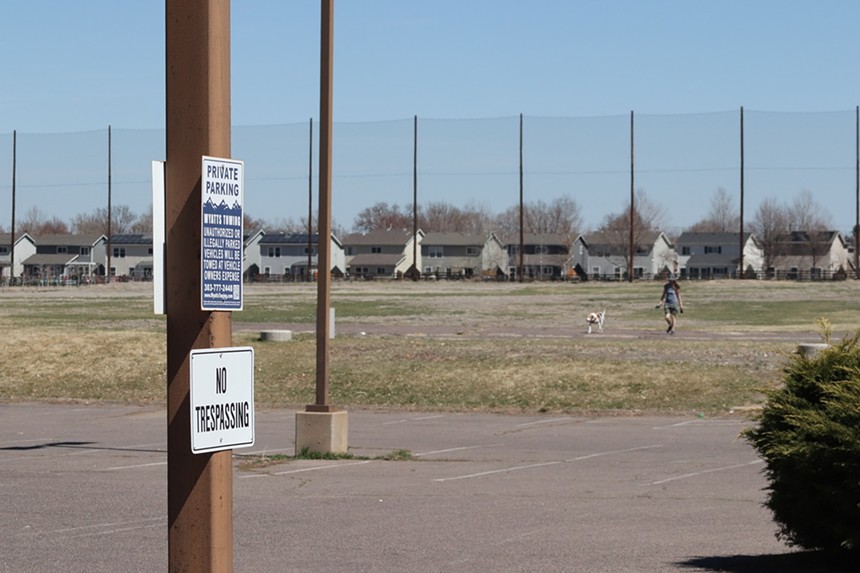For Parks & Recreation, Johnston's Vibrant Denver transition team focused on permitting, connecting with nonprofits, the Park Hill Golf Course, investing in historically ignored areas, and pickleball (of course).
“Tensions between pickleball players and residents have escalated to concerning levels,” says the Parks & Rec memo, which went out on August 4. “While this is a national issue, resentment and distrust with DPR leadership decisions regarding expanding access and resisting well-known solutions have heightened tensions.”
At a July 10 forum held by the committee that examined the parks department, members of the public called out the aforementioned topics as spaces for improvement. They also took issue with former mayor Michael Hancock’s decision to change Scott Gilmore and John Martinez, deputy executive directors of Parks & Rec, to Career Services Authority status in 2021. The positions had previously been appointed by the mayor, but the pair will now be grandfathered into Johnston's administration, as CSA employees are protected.
In its recommendations, the parks committee — led by co-chairs Connie Rule and Jolon Clark — tackled the issue head-on. “The committee strongly recommends that the Mayor-Elect re-allocate those two appointments to Parks to build out a leadership team that embodies a culture of transparency, community engagement, change, and accountability.” the memo says. It also notes that culture and trust among staffers is poor.
"[There is] low engagement, satisfaction, and empowerment of employees up and down the org chart,” the memo charges. There is also “a clear perception that favoritism and cronyism played a significant role in employees' opportunity for advancement in the Department which has discouraged people exploring a DPR career.”
As for pickleball, the memo says there are over 10,000 active players in the metro Denver area and court capacity has not kept up with the demand.
In May, more than 6,000 picklers filed a formal appeal to the Parks & Recreation Advisory Board regarding the department’s treatment of the booming paddle sport — from the termination of pre-approved projects in Congress Park and Sloan’s Lake Park to the lack of transparency in decision-making around how the city is dealing with it.
“The Pickleball community is asking this board for a seat at the negotiation table,” says the appeal. "If we are not offered a seat at the table, we plan to peacefully bring folding chairs to your meetings so we are no longer on Denver Parks & Recreation’s menu.”
The transition memo specifically instructs the department to hire pickleball staff to coordinate the integration of the sport throughout the parks system and to facilitate more input from the community. It suggests keeping the Pickleball Advisory Group that was established in April and proposes giving picklers what they’ve been begging for: more courts — and fast.
“Immediately offer indoor pickleball programs with proper equipment and permanent lines at all Rec Centers while ensuring that no youth and local programming is displaced,” the memo suggests. “Add more pickleball courts citywide.”
Johnston's Parks & Recreation transition team also directs the department to explore a long-term growth strategy that considers acquiring property for a pickleball sports complex.
At the July 10 forum, resident Maria Girsch said, “We acknowledge that compared to real city issues that our mayor's dealing with, like affordable housing and homelessness, parks and pickleball is not necessarily up there." But pickleball will definitely be on the radar if Johnston's committee is listened to.
One major issue identified by picklers and other residents is the lack of transparency and community engagement by the department. Many of the transition committee's recommendations focus on improving that engagement.
“Create a specific plan to meet with and engage the community proactively and consistently in decision-making processes, ensuring that community engagement is transparent, shares power in the process, and is structured with a strong equity lens to meet communities and individuals where they are,” the memo says.
It also suggests consistent reporting policies on department goals and dollars. “Rebuilding trust will come through transparency, and that must be modeled by leadership,” the memo adds.
According to Johnston's parks transition team, city officials should examine certain systems that block communities from partnering with the department, particularly in permitting and programming.
Its memo also takes on one of the hottest park debates in recent years: what to do with the Park Hill Golf Course. In the municipal election in April, voters ruled it should be kept under a conservation easement rather than redeveloped. The property was purchased by Westside Investment Partners in 2019 for $24 million, with the intention of building a mixed-use community. Because of the easement, it could only be used as a golf course. Now that voters have affirmed that they’re not interested in Westside’s plan, however, the transition memo says it’s time for the city to buy the property back.
“The mayor should meet with the property owner to discuss the possibility of a sale and the steps required for acquisition,” it dictates. “A clear vision for the property should be announced, and a stakeholder group should be assembled accordingly to work towards acquiring the property.”
The golf course should be bought at fair market value considering the easement, the memo adds.
Other priorities identified in the parks committee recommendations include development and land acquisition strategies — particularly in historically under-resourced communities. The department has begun that work, but there is more to be done, it says.
“While this effort was flagged as a strength, it was noted that this is just the beginning of righting historical wrongs, and the department must continue to stay focused and committed to these investments,” the memo explains.
It also points out that park rangers and law enforcement staff need to become more diverse — especially in parks that receive less attention. There has been “a disheartening shift from structures that support youth of color and families with limited resources to a focus on accommodating well-heeled residents with abundant financial resources, flexibility with time and location, private clubs and activities” within the department, according to the memo.
In addition, the memo claims, there is a lack of accessibility for those with disabilities looking to use public parks. “Designing spaces with marginalized groups at the center leads to accessibility, inclusivity, and memorability for everyone,” it says. “Design should prioritize high accessibility for people with disabilities, pay homage to neighborhood history and culture, and include requested amenities like restrooms and water fountains.”
Improving access to mountain parks, potentially with “a free chartered bus to access our mountain parks — prioritizing the communities and groups that do not have equal access," is another recommendation related to equity in the park system.
Finally, the report advises the parks department to ensure that climate and resiliency is built into its strategic plan as it reviews its goals. “Our parks and public spaces should provide areas for residents to find relief from an intensifying climate while also providing natural habitat, attracting pollinators, and providing critical support for natural systems,” it says.
The memo calls for aggressive work on the city’s tree canopy and better engagement with youth in parks, as well as management of the goose population in the city to prevent the need for culling.
The report’s authors suggest that the department still needs to conduct a listening tour and get more public input in order to develop further plans.
“With just a few weeks to complete the process of discussion and synthesis, the committee does not feel this was a thorough and inclusive approach to bringing community voice to this report,” they say. “However, the committee agreed that what follows is a thoughtful approach for the Johnston Administration and the new Parks and Recreation Executive Director for the first 100 days.”












